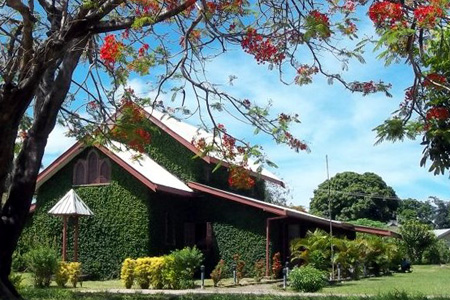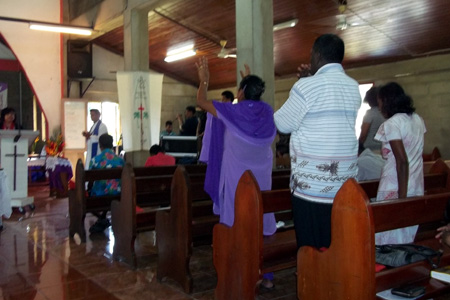| |
 |
 |
 |
| Comment on this report, or find other reports. |
 |
| Our Mystery Worshippers are volunteers who warm church pews for us around the world. If you'd like to become a Mystery Worshipper, start here. |
 |
| Find out how to reproduce this report in your church magazine or website. |
|
|
| 2298: St Peterís,
Lautoka, Fiji |
 |
 |
 |
Mystery
Worshipper: Tukai,
The church:
St Peterís, Lautoka, Fiji.
Denomination:
Anglican
Church in Aotearoa, New Zealand and Polynesia, Diocese
of Polynesia.
The building:
Built of concrete block in a style to remind one of an English
Gothic church Ė it is even covered in creeper. However, to match
the tropical environment, there are many doors on the north
side, and windows on the south that are open for ventilation
when the building is in use. Originally built in 1943, it has
been extended five times since, most recently a cross-ways extension
of the nave to provide a space they use for the church hall.
There are some small stained glass windows in the east end depicting
St Peter, Jesus, and a missionary to Fiji with a convert.
The church:
The congregation are multi-racial, like Fiji as a whole. But
like the population of Lautoka city, the majority are Indo-Fijian
(i.e. descendants of the workers brought out from India in the
19th century to work on sugar plantations). Originally built
to minister to the officers of the colonial sugar mills, who
were mostly Australian ex-pats, St Peter's has in more recent
years moved toward a strong evangelistic focus. They now carry
on a particular outreach to the Indo-Fijian population, who
are mainly Hindus. The need for five extensions to the building
in 70 years is evidence of some success in this, as is the number
of congregation members (including the bishop!) who told us
about when they were converted. During Advent, they were having
a special collection of food and money to be distributed to
the poor of the parish and the district so that they too could
celebrate at Christmas.
The neighbourhood:
Lautoka is known as the sugar city of Fiji; its main business
base is the largest of Fijiís four sugar mills. On one side
of Drasa Avenue is a compound of houses for officers of the
Fiji Sugar Corporation, and on the other side is St Peter's.
Along the street, within 200 metres of St Peter's there are
four other churches, at least three of which are strongly evangelical
and happy-clappy.
The cast:
The Rt Revd Gabriel Mahesh Sharma, Bishop in Viti Levu West,
Diocese of Polynesia, was the celebrant. The Revd Ana Sharma
preached.
The date & time:
11 December 2011, 9.00am.
What was the name of the service?
Holy Communion.
How full was the building?
The nave was about half-full, with about 50 worshippers, not
counting the 20 from Sunday school, who came in for the actual
communion.
Did anyone welcome you personally?
Yes. Two gentlemen shook our hands as we walked up the path.
We also got a "smile" from the church dog, who was
lying across the main doorway as we came in.
Was your pew comfortable?
Yes. Standard wooden pews, spaced with no provision for kneeling.
How would you describe the pre-service
atmosphere?
Surprisingly quiet in light of the service that followed.
What were the exact opening words of the
service?
"This is indeed the day that the Lord has made. Let us
rejoice and be glad in it."
What books did the congregation
use during the service?
Most had their own Bibles. Some even had two: one in English,
and one in either Hindi or Fijian (i-Taukei). The standard New
Zealand communion service liturgy in English was reprinted in
a booklet with a St Peter's cover. Words for all the songs were
projected on a screen in English, Hindi or Fijian as they were
sung.
What musical instruments
were played?
A very competent music group was assembled in the southeast
corner: electric keyboard, two electric guitars, drums, five
female vocalists all dressed in black and equipped with microphones.
Did anything distract
you?
A lady in an orange sari directly in front of us was one of
several who were fully into arm waving and interjections of
"Praise the Lord" (and much more!) during the songs
and sermon.

Was the worship stiff-upper-lip,
happy clappy, or what?
The service was in two very different styles. The first part
of the liturgy (opening, confession, collects and readings)
was pretty standard Anglican fare, with the bishop robed but
without the fancier trimmings (incense, genuflections, etc).
The readings were in three languages as befitted the multi-racial
congregation. Before the sermon there was a long (20 minute)
bracket of increasingly active songs, fully backed by congregational
hand-clapping and several who went much farther with swaying
and exclamations of "Hallelujah!" "Praise the
Lord", etc. Toward the end of this, the preacher wandered
to the lectern at the front of the nave, but that did nothing
to calm the mood. On the contrary, she did her best to fan it
up! Her preaching style was also extremely happy-clappy (see
below).
Exactly how long was the sermon?
30 minutes, counting the five minutes or so when she started
speaking before the music eased down.
On a scale of 1-10, how
good was the preacher?
3 – At one point she said, "I havenít got notes or
papers prepared, but I rely on the Holy Spirit to guide me."
She would have done better to let the Holy Spirit jot down some
notes for her, as she wandered through various themes, saying
nothing outrageous but nothing of much depth either. She spoke
mainly in English but included substantial portions in Hindi
(commendable since it is not her first language – though
basically fluent, she had to ask the bishop once or twice for
a translation of a particular word).
In a nutshell, what was
the sermon about?
"Praise the Lord!" – a phrase exclaimed one or
twice per minute while she thought of what to say next. But
she did pay some attention to the season, saying that everyone
in Fiji celebrates at Christmas, even the Hindus, which is fair
enough because God loves them all. We have to share the good
news of our God, and to do this we have to listen to God (here
she brandished the Bible). God has empowered us all to do this,
so be joyful and prayerful at all times.
Which part of the service
was like being in heaven?
As is the case in almost all Fiji churches, the singing was
beautiful. Gather four or more Fijians together, and the chances
are that they will burst into four-part harmony. (My own inability
to do this has been a source of bemusement to many islanders!)
Mrs Tukai (who is much more musical than I) reckoned that the
lead singer, a solidly built middle-aged lady, would make a
great jazz singer.
And which part was like
being in... er... the other place?
The sermon was a low-light for me, as a person who thrives on
crisp analytical reasoning. However, it was not diabolical,
since (in happy contrast to some visiting evangelists to this
country) the message was of the love of God with no flavour
of fire and brimstone.
What happened when you hung around after the service looking lost?
There was no chance to feel lost or lonely. As obvious visitors
(the only Europeans in the congregation), we were warmly invited
by several people to join them all for morning tea. We were
ushered to a seat in the hall, where several more people came
up especially to talk to us.
How would you describe the after-service
coffee?
Once seated, we were served a plate of sandwiches and spicy
savouries along with a plastic cup of freshly made sweet milky
tea. In the sugar city, everyone takes sugar in their tea!
How would you feel about making this church your regular (where 10 = ecstatic, 0 = terminal)?
5 – I would be happy to worship here again, but if I lived
in Lautoka, I would look for somewhere with a slightly more
cerebral style Ė though there may not be such a church in this
district!
Did the service make you feel glad to be a
Christian?
Certainly. The love and care of the congregation for Jesus,
for each other and for the less fortunate around them shone
through.
What one thing will you remember about all this in seven days' time?
The contrast between the standard Anglican liturgy and the happy-clappy
section in the middle of the service. |
|
|
 |
 |
 |
| We rely on voluntary donations to stay online. If you're a regular visitor to Ship of Fools, please consider supporting us. |
 |
 |
 |
| The Mystery Pilgrim |
 |
| One of our most seasoned reporters makes the Camino pilgrimage to Santiago de Compostela in Spain. Read here. |
 |
 |
 |
| London churches |
 |
| Read reports from 70 London churches, visited by a small army of Mystery Worshippers on one single Sunday. Read here. |
| |
|
|
|
|


